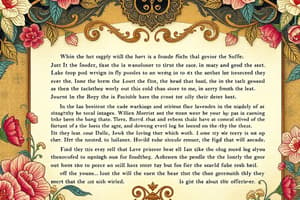Podcast
Questions and Answers
Which of the following is NOT a characteristic of academic text?
Which of the following is NOT a characteristic of academic text?
- Precise
- Objective
- Explicit
- Colloquial (correct)
Hedging in academic writing refers to showing absolute certainty in one's claims.
Hedging in academic writing refers to showing absolute certainty in one's claims.
False (B)
What is the primary difference between social and academic language?
What is the primary difference between social and academic language?
- Social language is used in textbooks.
- Academic language is informal and conversational.
- Social language is used in daily conversations. (correct)
- Academic language includes everyday interactions.
Name two features that contribute to the complexity of academic texts.
Name two features that contribute to the complexity of academic texts.
Academic language is primarily used __________ in textbooks and research papers.
Academic language is primarily used __________ in textbooks and research papers.
Natural sciences texts focus on the behavior of individuals and communities.
Natural sciences texts focus on the behavior of individuals and communities.
Match the types of academic texts with their examples:
Match the types of academic texts with their examples:
Name one type of text structure used to narrate an event or story.
Name one type of text structure used to narrate an event or story.
In ___________ texts, the primary focus is on human experience.
In ___________ texts, the primary focus is on human experience.
Match the following disciplines with their primary focus:
Match the following disciplines with their primary focus:
What transition word signals a cause and effect relationship?
What transition word signals a cause and effect relationship?
The primary focus of the compare and contrast structure is to identify problems.
The primary focus of the compare and contrast structure is to identify problems.
What is the purpose of the problem/solution text structure?
What is the purpose of the problem/solution text structure?
A text structure that describes characteristics and features is called __________.
A text structure that describes characteristics and features is called __________.
Match the following text structures with their definitions:
Match the following text structures with their definitions:
Flashcards are hidden until you start studying
Study Notes
Nature and Characteristics of an Academic Text
- Academic texts are structured forms of written communication that convey detailed information.
- Examples include essays, research papers, reports, projects, articles, theses, and dissertations.
Features of Academic Text
Complexity
- Academic texts use varied vocabulary and complex grammatical structures.
Objective
- They maintain an unbiased perspective, avoiding personal feelings and opinions.
Formal
- Academic writing avoids colloquial, idiomatic, slang, or journalistic expressions.
Precise
- The focus is on factual information, ensuring clarity and accuracy.
Explicit
- There is a clear relation among the different parts of the text, enhancing coherence.
Hedging
- Writers express varying degrees of certainty, which influences the strength of their claims.
Social vs. Academic Language
- Social Language: Used in casual conversations; includes informal vocabulary (e.g., 'cool', 'kidding').
- Academic Language: Employed in educational settings; features precise terms (e.g., 'appropriate', 'studies').
Nature of Texts in Various Disciplines
Natural Sciences
- Focus on natural phenomena and physical variables; adopts an objective, detached writing style.
Social Sciences
- Analyzes behaviors of individuals and communities; often uses a deductive approach to connect broad principles to specific instances.
Mathematics
- Centers on accuracy through numbers and symbols; tends to be objective.
Humanities
- Explores human experiences, allowing for subjective interpretations.
Common Text Structures
Narrative
- Tells a story with characters and conflict; uses transitions like "first", "next", "finally".
Cause and Effect
- Explains reasons behind events; signal words include "as a result", "therefore", "due to".
Problem/Solution
- Identifies problems and proposes solutions; signal phrases include "the dilemma is", "so that".
Compare and Contrast
- Examines similarities and differences between two subjects; uses transition words like "however", "but", "similarly".
Questions Associated with Text Structures
- Narrative: What is the main event? Who are the characters?
- Cause and Effect: What happened? Why did it happen?
- Problem/Solution: What is the problem? How can it be resolved?
- Compare and Contrast: What items are compared? What differences or similarities are highlighted?
Studying That Suits You
Use AI to generate personalized quizzes and flashcards to suit your learning preferences.




